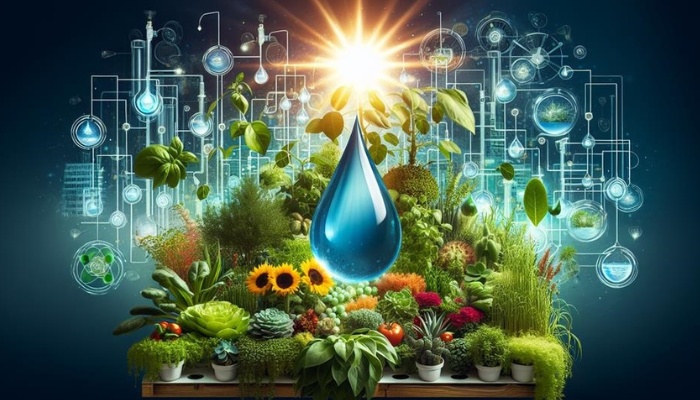Distilled water, stripped of minerals and impurities, offers you a blank canvas, allowing precise nutrient management and potentially enhancing plant growth. However, it’s not without its drawbacks and risks.
As you explore this choice, you’ll discover how to harness its benefits while navigating its challenges, ensuring your hydroponic system thrives.
Why Choose Distilled Water
Choosing distilled water for your hydroponics system ensures that your plants receive the purest form of hydration, free from contaminants that can hinder growth.
You’re not just opting for a method that promotes healthier plant development; you’re also considering the broader picture: water availability and environmental impact.
Distilled water, being devoid of minerals and impurities, prevents the accumulation of unwanted substances in your system.
This precision in water quality allows you to manage your resources more efficiently, ensuring that every drop serves its intended purpose without waste.
Additionally, the environmental impact of using distilled water is significant. By eliminating the risk of introducing pollutants and chemicals into your system, you’re actively contributing to a more sustainable practice.
Traditional farming methods often lead to runoff, which carries fertilizers and pesticides into nearby water bodies, affecting aquatic life and water quality.
In contrast, hydroponics with distilled water minimizes these risks, showcasing a commitment to not only your plants’ health but also to the preservation of our planet’s water resources.
In essence, your choice of distilled water reflects a thoughtful approach to hydroponics, balancing the need for pure water with a responsibility toward environmental stewardship.
Enhanced Plant Growth
Utilizing distilled water in your hydroponics system can significantly boost plant growth by ensuring they receive the highest quality hydration without any detrimental impurities.
This purity promotes not only healthier but also faster-growing plants. When you opt for distilled water, you’re choosing a medium that naturally enhances pH stability and oxygen levels, both of which are critical for optimal plant development.
- pH Stability: Distilled water maintains a neutral pH, reducing fluctuations and simplifying pH management.
- Enhanced Oxygenation: Higher oxygen levels in distilled water encourage robust root growth and efficient nutrient uptake.
- Impurity-Free: The absence of contaminants prevents root damage and promotes healthier plant growth.
- Predictable Outcomes: With variables like water quality controlled, plant growth becomes more consistent and reliable.
- Easy Nutrient Absorption: Pure water ensures nutrients are directly available to plants without interference.
Nutrient Control Precision
By using distilled water in your hydroponics setup, you’ll gain unparalleled precision in nutrient control, directly impacting plant health and yield.
The absence of minerals and contaminants in distilled water provides a clean slate, allowing you to fine-tune nutrient mixes with exactness.
This precision in water sourcing is critical for maintaining optimal pH stability, which is essential for nutrient uptake.
Consider these benefits of precise nutrient control:
- Maximized Growth: With the ability to meticulously adjust nutrient levels, you’re ensuring that your plants receive the exact nutrition they need, when they need it, fostering accelerated growth and development.
- Enhanced Health: Distilled water’s purity reduces the risk of nutrient lockout, a condition that stifles plant growth. Thus, your plants will remain vibrant and healthy.
- Elevated Yields: Precision in nutrient delivery often translates to increased yields as plants can fully exploit the provided nutrients without wastage or deficiency.
- Consistent Quality: Employing distilled water for nutrient control contributes to the consistent quality of your produce, batch after batch.
Potential Drawbacks
While distilled water offers significant advantages for nutrient control in hydroponics, it’s important to consider its potential drawbacks, including the added costs and maintenance it entails.
One of the primary concerns you’ll face is equipment cost. The initial investment required to set up a distillation system can be substantial.
You’re not just buying a piece of equipment; you’re investing in the technology that will ensure your water is pure and free of contaminants.
This isn’t a one-time cost either. Over time, you’ll need to maintain and possibly replace parts of your distillation system, adding to your overall expenses.
Another significant issue is storage challenges. Distilled water needs to be stored properly to maintain its purity. This means you’ll need clean, non-reactive containers and a space that’s free from contaminants.
Finding adequate storage space can be a hassle, especially if you’re operating in a limited area. Additionally, keeping the storage environment up to standard requires continuous attention and resources.
While distilled water can enhance your hydroponic system’s efficiency and yield, it’s important to weigh these benefits against the added costs and logistical challenges.
Equipment cost and storage challenges aren’t trivial and can impact the overall feasibility of using distilled water in hydroponics.
Mitigating Risks
To effectively mitigate the risks associated with using distilled water in hydroponics, you’ll need to strategize around equipment costs and storage challenges.
Approach this with a keen analytical mindset, focusing on the implementation of precise solutions that ensure a successful hydroponic system. Here are key strategies:
- Implement a water recycling system to minimize cost and environmental impact. Water recycling conserves this precious resource and reduces the frequency of distillation processes needed, making your operation more sustainable and cost-effective.
- Invest in reliable pH meters and controllers. The absence of minerals in distilled water makes your system more susceptible to pH fluctuations. Regular monitoring and timely adjustments will keep your nutrient solution within the optimal range for plant growth.
- Calculate the storage requirements accurately. Ensuring you have adequate storage for distilled water mitigates the risk of shortages, which could halt your operation. Consider space-efficient storage solutions that maintain water purity.
- Educate yourself on nutrient balance. Since distilled water lacks minerals, it’s essential to master the art of nutrient supplementation. Precise adjustments based on regular water testing will maintain the health and productivity of your hydroponic plants.

